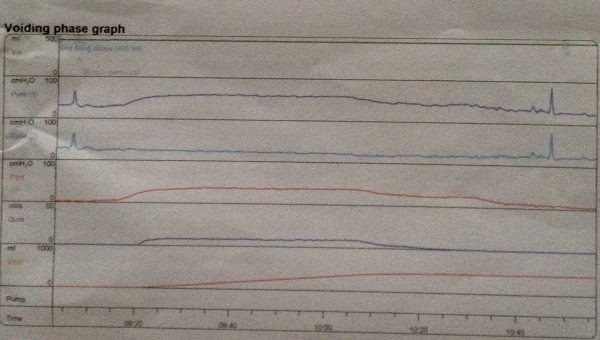Session Information
Date: Thursday, June 23, 2016
Session Title: Dystonia
Session Time: 12:00pm-1:30pm
Location: Exhibit Hall located in Hall B, Level 2
Objective: To report two atypical associations of pRBD and DO we came across with a case of primary cervical dystonia.
Background: RBD (REM sleep Behaviour Disorder) is an early feature of neurodegenerative synucleinopathies.(1) There are reports on the disturbances in the sleep domain as a non-motor manifestation in focal dystopias, but RBD has not been described hitherto.(2) Another entity which is associated with synucleinopathies is neurogenic Detrusor Overactivity(DO).(3) Literature on neurogenic DO in focal dystonias is limited.(4)
Methods: 37 year old lady presented with involuntary movements of neck preceded by recurrent episodes of Dream Enactment Behaviour(DEM) associated with sleep enuresis of 1 month duration. Similar complaints troubled her in the adolescence at around the age of 20 years, relieved then with anticholinergics. No bladder symptoms like urgency or frequency or any symptoms during daytime. Her general physical and system examinations were unremarkable except for the torticollis to the left side with ‘geste antagoniste’. EEG and imaging of the neuraxis and pelvis were normal. A Urodynamic study observed DO. PSG was not done due to financial constraints. With the above findings a clinical diagnosis of primary cervical dystonia with pRBD and neurogenic FO was made. She was treated with Tetrabenazine and there was significant improvement. 
Results: The term pRBD(probable RBD) is now frequently used in situations where PSG confirmation of RBD is not feasible. Damage to LDTg and PPTg nuclei in the pins has been described in synuclein-associated neurodegeneration. These nuclei are also implicated in the pathogenesis ofRBD.(5) Similar changes in cervical dystonia might explain our clinical findings of pRBD. The basal ganglia and subcortico- cortico-sub cortical feedback circuits are involved in the pathogenesis of cervical dystonia. Dopaminergic subcortical pathways are thought to inhibit the pontine micturition centre.(4) The involvement of this circuitry might explain the DO in cervical dystonia.
Conclusions: We are hereby presenting a case of a primary cervical dystonia with two atypical associations of pRBD and DO. This clinical scenario prompts us to think about the role of basal ganglia and LDTg and PPTg pontine nuclei in the pathogenesis of cervical dystonia as in synucleinopathies. Further studies may be needed to substantiate these postulations.
To cite this abstract in AMA style:
S.L. Bhadran, M.G.J. Jacob, S. Kripal. Probable REM sleep behaviour disorder and detrusor overactivity in primary cervical dystonia- A case report [abstract]. Mov Disord. 2016; 31 (suppl 2). https://www.mdsabstracts.org/abstract/probable-rem-sleep-behaviour-disorder-and-detrusor-overactivity-in-primary-cervical-dystonia-a-case-report/. Accessed January 16, 2026.« Back to 2016 International Congress
MDS Abstracts - https://www.mdsabstracts.org/abstract/probable-rem-sleep-behaviour-disorder-and-detrusor-overactivity-in-primary-cervical-dystonia-a-case-report/
